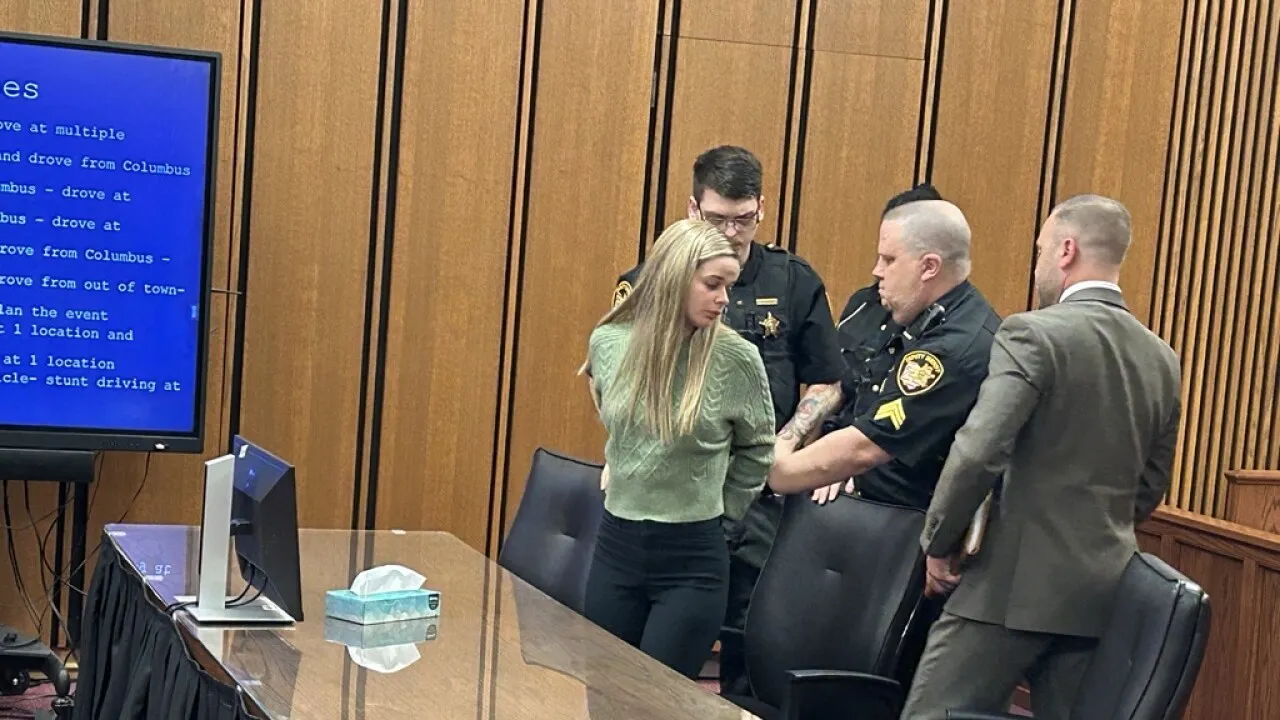In a tense-filled courtroom, 23-year-old Ashlyn Rogers from Port Clinton, Ohio, heard her verdict: 18 months of imprisonment for organizing and participating in a series of street takeovers that paralyzed Cleveland in the fall of 2024. The trial, which concluded on Tuesday, capped a high-profile case that exposed a troubling trend of unauthorized street actions sweeping the city, sparking public outrage and raising complex questions about accountability in the digital age.
Rogers, whom prosecutors described as a key participant in events on September 28 and 29, 2024, received 18 months for public order disturbances and 12 months for participating in mass riots, with these sentences to be served concurrently. The judge also credited her with two days of pre-trial detention, but this was scant comfort for the young woman whose life is now marked by a felony conviction. In addition to her prison sentence, Rogers was ordered to forfeit her 2020 Infiniti Q50 — a symbolic blow emphasizing the seriousness of her actions.
Chaos on Cleveland's Streets
Last autumn, Cleveland became a battleground of daring street takeovers that transformed city intersections into zones of lawlessness. On September 28 and 29, crowds of young people blocked key highways, including Interstate 90, creating chaos: drivers performed dangerous maneuvers known as "donuts" around police cars, shot non-lethal projectiles at law enforcement officers, and set off fireworks. One of the most striking incidents occurred when masked mobs attacked a party bus on the highway, leaving passengers terrified for their lives.
The prosecution argued that Rogers played a central role in inciting this chaos. Assistant Prosecutor Connor Devine stated that although she may not have planned every event, her activity on Instagram — posting rules, locations, and calls for participation — served as a catalyst for illegal actions. "She wasn’t just a spectator," Devine said in court. "She amplified this dangerous activity by guiding others to participate."
Evidence presented in court included text messages and videos from Rogers’ phone illustrating her behavior in the days leading up to the takeovers. However, Rogers refused to review these materials during the trial, which observers suggested could indicate her unwillingness to confront the full weight of her actions.
Remorse in Court
In an emotional statement before sentencing, Rogers expressed remorse, admitting her guilt. "I understand that my actions were wrong, and I deeply regret the choice that led me here," she said, her voice trembling with emotion. "I am not here to justify or diminish my actions but to sincerely apologize for the harm caused by my choices." When the judge announced the sentence, Rogers hid her face in her hands, her shoulders trembling with sobs.
Her lawyer, Brad Wolf, passionately defended his client, arguing that the long-term consequences of a felony conviction outweigh even a harsh prison term. "Her reputation and that of her family will be tainted for a very long time, if not forever," Wolf told the judge, requesting leniency. However, the court remained steadfast, emphasizing the need to deter similar actions in the future.
Broader Context
Rogers’ case highlights the growing problem of street takeovers increasingly organized via social media. These events, combining youth culture, bravado, and open law-breaking, have become a headache for law enforcement across the country. In Cleveland, a city with long-standing tensions between the community and police, these takeovers have sparked a broader conversation about public safety, digital responsibility, and the limits of protest.
Insiders within the Cleveland city government, requesting anonymity, note that local officials are considering new measures to combat such incidents, including increased monitoring of social media and tougher fines for organizing unauthorized gatherings. Critics, however, argue that such measures risk infringing on free speech and could lead down a slippery slope toward overreach and excessive control.
For residents of Port Clinton, a quiet town on Lake Erie, Rogers’ case was a shocking revelation. Locals who knew her as an ambitious young woman express mixed feelings. "She’s a good girl, but perhaps she fell in with the wrong crowd," said one neighbor, who declined to give her name. Others, however, are less forgiving, viewing her actions as a betrayal of their community's values.
Uncertain Future Ahead
As Ashlyn Rogers prepares to serve her sentence, her case serves as a stark reminder of how fleeting decisions in the digital world can have profound real-life consequences. For Cleveland, a city still recovering from the chaos of September 2024, the verdict is a step toward restoring order, but questions about how to prevent such events in the future remain unresolved.
Rogers, who once dreamed of a career in marketing, now faces an uncertain future marked by the burden of a felony conviction. Her story is a cautionary tale for a generation living online, where the line between free expression and lawlessness can be dangerously thin.



